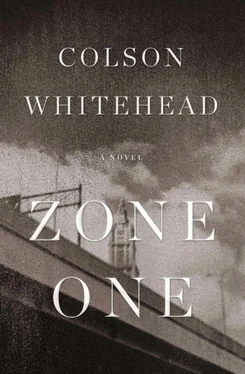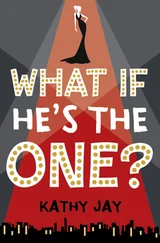The scientists wanted the sweeper data to superimpose it on their map of the smithereens and generate prophecies. Kaitlyn and her stories of the past were another stencil to lay over the disaster, to remind them of the former shape of the world. In their separate warrens, these different parties toiled over the future with their instruments: “We Make Tomorrow!” Why else were they in Manhattan but to transport the old ways across the violent passage of the calamity to the safety of the other side? If you don’t believe that, Mark Spitz asked himself, why are you here?
• • •
Omega finished the operation in Human Resources. It was a larger and messier cleanup than usual for a single room in an office building. Four rabid infected in one room, that was a blip in a straggler mission, especially after the marines’ monstrous cull. Nothing Mark Spitz couldn’t handle, but he cursed the idea that months of dropping stragglers had attenuated his skills.
There were your standard-issue skels, and then there were the stragglers. Most skels, they moved. They came to eat you—not all of you, but a nice chomp here or there, enough to pass on the plague. Cut off their feet, chop off their legs, and they’d gnash the air as they heaved themselves forward by their splintered fingernails, looking for some ankle action. The marines had eliminated most of this variety before the sweepers arrived.
The stragglers, on the other hand, did not move, and that’s what made them a suitable objective for civilian units. They were a succession of imponderable tableaux, the malfunctioning stragglers and the places they chose to haunt throughout the Zone and beyond. An army of mannequins, limbs adjusted by an inscrutable hand. The former shrink, plague-blind, sat in her requisite lounge chair, feet up on the ottoman, blank attentive face waiting for the patient who was late, ever late, and unpacking the reasons for this would consume a large portion of a session that would never occur. The patient failed to arrive, was quite tardy, was dead, was running through a swamp with a hatchet, pursued by monsters. The pock-faced assistant manager of the shoe store crouched before the foot-measuring instrument, frozen, sans customers, the left shoes of his bountiful stock on display along the walls of the shop on miniature plastic ledges. The vitamin-store clerk stalled out among the aisles, depleted among the plenty, the tiny bottles containing gel-capped ancient remedies and placebos. The owner of the plant store dipped her fingers into the soil of a pot earmarked for a city plant, one hearty in the way the shop’s customers were hearty, for wasn’t every citizen on the grand island a sort of sturdy indoor variety that didn’t need much sunlight. A man wrapped in the colors of the Jamaican flag loitered over the new bongs, the crème de la crème of head-shop apparatus, rainbow bulbs perforated according to the latest notions about air circulation, intake, draw. No smoke, no fire. In the desolate consumer-electronics showroom, the up-selling floor salesman halted mid-pitch, as if psychoanalyzing a skeptical rube who was simply, ever and always, not in the room, not in the market for purchases big-ticket or otherwise. A man bent before a mirror that perched on the glass counter of a sunglasses store, his fingers holding on the arms of invisible shades. A woman cradled a wedding dress in the dressing room’s murk, reenacting without end a primal moment of expectation. A man lifted the hood of a copy machine. They did not move when you happened on them. They didn’t know you were there. They kept watching their movies.
One morning Mark Spitz stumbled on some brain-wiped wretch standing at the fry station of the big hamburger chain and had to shoot him on general principles. Out of the abundance of a life, to choose fry duty.
They were safe in their houses. In front of the televisions, of course, a host of this type biding their time until the electricity came back on, the problem was solved, and the program resumed where it had stopped. All the time in the world. Their lives had been an interminable loop of repeated gestures; now their existences were winnowed to this discrete and eternal moment. In the bath, fully clothed before the nippled showerhead and its multiple-flow settings. Tilting a fluted vacuum attachment toward the scrunched curtains and their legendary hard-to-reach places. Underneath blankets and duvets whose number and thickness referred to a different season, a previous winter of mysterious significance. Slipping a disc into the game machine. Crotch-down on the yoga mat. Spooning bran from a bowl. Surfing the dead web. Yawning. Stretching. Flossing. Wound down and alone in their habitat.
For Omega’s purposes, their habitat was Zone One.
In Human Resources, Gary corralled purses and read out the ages of the dead. He didn’t bother with the names. No one cared about the names, not them, not the higher-ups. Since they hadn’t maintained records of the dead starting Last Night, there was no point: easier to keep records of the living. Fewer numbers to work with, for one thing, and unimpeachable given the ascension of the survivor rolls to the status of holy register. They endured setbacks—supply lines broke down and refuges were overrun, not so much now, but in the interregnum everyone had been forced to flee a hideout or ill-considered shelter multiple times. No matter the daily advances and reversals, however, the names of the survivors maintained their willful stream into the zones of stability, over the comm, scrawled on paper, recited from memory by the weary emissary of a band coming in from the cold: These are the living.
Kaitlyn assigned Gary to ID collection, having picked up on Mark Spitz’s aversion grids ago. He recoiled at going into people’s wallets, pawing through their purses. Too much of the dead world floating in there. The detritus that passed for identity, the particulate remains of twenty-first-century existence, fluttered down to settle at the bottoms of wallets and clutches and messenger bags. The indicators of their brief appearance on the planet waited for Mark Spitz: the flavored gums and lip balms that would never again be manufactured, the despised driver’s license photos that were the only proof that they’d had faces, the snaps of the kids and collies and boyfriends, the just-in-case tampons. All those keys to empty apartments now painted in blood, where lovers decomposed on the wall-to-wall. The fossil evidence that there had once been other types of people besides survivors.
Touching these artifacts nauseated him now, in the latest manifestation of his PASD. The first time he got sick, the unit had completed a sweep of a party-supply store, a narrow nook on Reade that had been washed off Broadway into a low-rent eddy. Dusty costumes hung from the ceiling as if on meat hooks: cowboys and robots from chart-busting sci-fi trilogies, ethnically obscure kiddie-show mascots, jungle beasts with long tails intended for the flirty tickling of faces. Kingdoms’ worth of princesses and their plastic accoutrements, stamped out on the royal assembly line, and the requisite Naughty Nurse suspended in the dead air, tilting in her rounds. Do Not Expose to Open Flame. For Amusement Only. The masks had been made in Korea, delivering back to the West the faces they had given the rest of the globe: presidents, screen stars, and mass murderers. The rubber filament inevitably snapped from the staple after five minutes. The graft wouldn’t take.
Gary crouched on the floor of the party-supply store and slit open the belly of a goat-shaped piñata with his blade. “We didn’t know they made this candy anymore.”
Mark Spitz removed his glove and rolled some bonbons in his hand. They were flavor combos of fruit he’d never heard of, the habitués of a jungle on another damp hemisphere. “That stuff has been in there since before you were born,” he said.
Читать дальше












